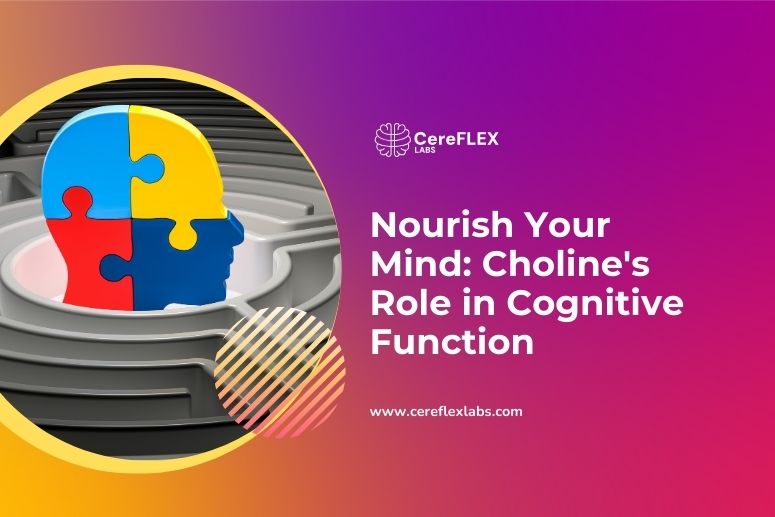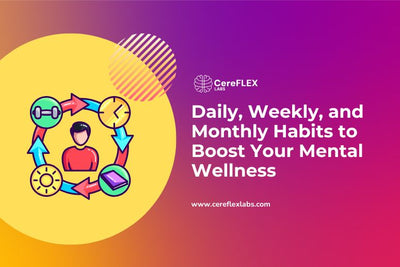The brain relies on essential nutrients to function at its best. Many people seek natural brain boosters to enhance cognitive performance, improve memory, and sharpen mental clarity. Among these, choline stands out as a crucial nutrient for brain health.
Choline plays a vital role in neurotransmitter production, brain cell maintenance, and overall cognitive performance. It is a key precursor for acetylcholine, a neurotransmitter responsible for learning, focus, and memory retention. Additionally, choline helps maintain brain cell membrane integrity, contributing to long-term cognitive resilience and mental sharpness.
Despite its importance, many people do not get enough choline from their diet. A deficiency can lead to brain fog, memory issues, and an increased risk of cognitive decline as they age. Understanding choline's benefits, dietary sources, and supplementation options can significantly improve brain function and long-term mental health.
By incorporating choline-rich foods or supplements into your routine, you can support better memory, mental energy, and overall cognitive wellness at every stage of life.
What is Choline?
Choline is an essential nutrient that plays a critical role in brain function, metabolism, and overall health. While it is often grouped with B vitamins, choline is neither a vitamin nor a mineral. Instead, it is a water-soluble compound that supports various bodily functions, including cognitive performance, energy metabolism, growth, and development.
Your body produces small amounts of choline, but most of it must come from your diet or supplements to meet daily needs. Choline is particularly important for:
- Brain Health – It helps create neurotransmitters that support memory, learning, and focus.
- Liver Function – It aids in fat metabolism and prevents liver damage.
- Muscle Control – It supports nerve communication, essential for movement and coordination.
Choline is a building block for two essential compounds in the brain:
- Acetylcholine (ACh) – A neurotransmitter crucial for memory formation, learning, and muscle control. It enables communication between neurons and plays a key role in cognitive function.
- Phosphatidylcholine (PC) – A major component of cell membranes, helping to maintain brain cell integrity and acting as a reservoir for acetylcholine production.
By supporting healthy neurotransmitter levels, choline enhances learning, focus, memory retention, and mental clarity while also benefiting muscle performance.
Cognitive Benefits of Choline
Choline is essential for brain health at every stage of life, from early development to aging. It plays a crucial role in neurotransmitter production, nerve signaling, and brain cell maintenance, impacting cognitive performance and overall mental well-being. Many people exploring cognitive enhancement also look into the benefits of nootropics, a broader category of compounds that support brain function.
Let’s find out how choline improves cognitive function:

1. Enhances Learning and Memory
Choline is a key precursor to acetylcholine, a neurotransmitter essential for memory formation, recall, and learning. It supports multiple types of memory, including:
- Working memory (short-term retention)
- Long-term memory (storing and retrieving information)
- Memory consolidation (transferring short-term memories into long-term storage)
Research indicates that low choline intake is linked to an increased risk of dementia and Alzheimer’s disease. Maintaining optimal acetylcholine levels helps preserve brain plasticity, which naturally declines with age. By ensuring sufficient choline intake, individuals can support cognitive resilience, memory retention, and mental sharpness throughout life.
2. Supports the Nervous System
Choline plays a fundamental role in central nervous system function by:
- Strengthening nerve cell membranes
- Enhancing neural communication for better cognitive processing
- Aiding in the production of acetylcholine, which regulates breathing, heart rate, and muscle movements
Although only a small portion of dietary choline is converted into acetylcholine, this process remains vital for proper nerve signaling and coordination.
3. Boosts Mood and Mental Clarity
Beyond memory, choline influences mood stability, mental energy, and focus. Research suggests that low choline levels are associated with:
- Brain fog and difficulty concentrating
- Fatigue and reduced mental energy
- Mood instability, including increased anxiety levels
Research on a subsample of the Hordaland Health Study found that individuals with the lowest choline levels had a significantly higher likelihood of experiencing anxiety compared to those with optimal levels.2 By supporting neurotransmitter balance, choline promotes emotional stability, mental clarity, and sharper focus.
How much choline do you need?
Choline requirements vary based on age, gender, and genetics. Determining exact intake can be challenging since choline levels in foods are not always well-documented. However, health authorities have established Adequate Intake (AI) values to help guide daily consumption.
Recommended Daily Choline Intake (AI) by Age Group |
|
|---|---|
|
Age Group |
Choline Intake (mg/day) |
|
0–6 months |
125 |
|
7–12 months |
150 |
|
1–3 years |
200 |
|
4–8 years |
250 |
|
9–13 years |
375 |
|
14–19 years (women) |
400 |
|
14–19 years (men) |
550 |
|
Adult women |
425 |
|
Adult men |
550 |
|
Pregnant women |
930 |
|
Breastfeeding women |
550 |
Choline Deficiency Risks
Not getting enough choline can lead to serious health consequences, affecting the liver, brain, muscles, and pregnancy outcomes.
- Liver and Muscle Damage – A study of 57 adults found that 77% of men, 80% of postmenopausal women, and 44% of premenopausal women developed liver or muscle damage after following a choline-deficient diet.3
- Pregnancy Complications – Low choline intake has been linked to neural tube defects in unborn babies and an increased risk of preeclampsia, premature birth, and low birth weight.
- Cognitive Decline – Insufficient choline may contribute to Alzheimer’s disease and other brain disorders due to its role in acetylcholine production and neuronal function.
- Heart Disease Risk – Choline deficiency can impact lipid metabolism, potentially increasing the risk of cardiovascular diseases.
Ensuring adequate choline intake through diet or supplementation can help prevent these health issues and support overall cognitive and physical well-being.

What foods are high in choline?
Choline is found in a variety of foods, with animal-based products being the richest sources. However, plant-based options also provide moderate amounts, making it possible for vegetarians and vegans to obtain choline through a well-balanced diet.
Animal-Based Sources (Highest Concentrations)
Animal products, particularly organ meats, eggs, and seafood, contain the highest amounts of choline.
Organ Meats (Extremely High in Choline)
✔ Beef liver
✔ Beef kidney
✔ Beef brain
✔ Beef heart
Fish & Seafood (Rich in Choline)
✔ Salmon
✔ Herring
✔ Caviar
✔ Crab
✔ Canned oysters
✔ Canned tuna
Eggs (A Top Choline Source)
- Egg yolks contain 111 mg of choline per yolk.
- Eggs are also rich in lutein and zeaxanthin, which support fetal brain development during pregnancy.
Meat & Poultry (Good Sources of Choline)
✔ Beef
✔ Chicken breast
✔ Turkey breast
Plant-Based Sources
For those following a vegetarian or vegan diet, several plant foods provide moderate amounts of choline:
✔ Cooked edamame
✔ Cooked soybeans
✔ Soy milk
✔ Black beans
✔ Amaranth
✔ Quinoa
✔ Wheat germ
✔ Pumpkin seeds
✔ Cauliflower
✔ Red potatoes
✔ Artichokes
✔ Shiitake mushrooms
Types of Choline Supplements
Not everyone gets enough choline from diet alone. For those looking to enhance memory, focus, and brain health, choline supplements provide a concentrated source of this essential nutrient.
Citicoline (CDP-Choline)
Citicoline, also known as CDP-Choline, is a highly bioavailable form of choline found in every cell of the body. Once ingested, it breaks down into cytidine and choline, which support brain function in two key ways:
- Choline helps produce acetylcholine, the neurotransmitter responsible for memory, learning, and cognitive processing.
- Cytidine contributes to RNA synthesis and later converts into uridine, a compound essential for brain cell repair and neuroprotection.
CDP-Choline is widely used to support neuron health, enhance mental clarity, and protect against cognitive decline
Alpha-GPC (L-Alpha Glycerylphosphorylcholine)
Alpha-GPC is a potent form of choline derived from soy or sunflower lecithin. It is unique because it:
- Crosses the blood-brain barrier rapidly, making it one of the most effective choline sources for cognitive enhancement.
- Works alongside omega-3 fatty acids (DHA) and phosphatidylserine (PS) to help form and repair brain cell membranes.
- Supports the production of acetylcholine, aiding in memory retention, focus, and neuroplasticity.
Phosphatidylcholine (PC)
Phosphatidylcholine is a major component of cell membranes and plays a role in liver function, brain health, and overall cell integrity. Key benefits include:
- Maintaining neuron structure and function.
- Supporting liver health, as it aids in fat metabolism and prevents fatty liver disease.
- Acting as a reservoir for acetylcholine production, contributing to cognitive performance.

Who should take a choline supplement?
While most healthy adults can meet their choline needs through food sources, some individuals may require supplementation due to higher demands or dietary restrictions.
People who may benefit from choline supplements include:
✔ Pregnant and Nursing Women – Increased choline intake supports fetal brain development and reduces the risk of neural tube defects.
✔ Endurance Athletes – Physical exertion can deplete choline levels, affecting muscle coordination and recovery.
✔ Individuals with Genetic Variations – Some people have genetic factors that impair choline metabolism, making it harder to maintain optimal levels.
Consult a Healthcare Professional
Before taking any choline supplement, it's essential to speak with a trusted healthcare provider to determine the best supplement type for your needs and the correct dosage to avoid excess intake and potential side effects.
Are there any side effects of taking choline supplements?
Choline is essential for brain function, metabolism, and overall health, and it is generally safe when consumed through a balanced diet. However, excess choline intake—especially from supplements—can cause side effects.
Most people tolerate dietary choline well, but high doses from supplements may lead to discomfort or health concerns. It’s crucial to be aware of potential side effects, especially when exploring cognitive enhancement supplements.
Potential side effects of excess choline include:
Digestive Issues
High doses of choline supplements can cause nausea, diarrhea, vomiting, and stomach cramps. Some individuals may experience mild digestive discomfort, even at moderate intake levels.
Fishy Body Odor
When the body metabolizes choline, it produces trimethylamine (TMA). Gut bacteria convert TMA into trimethylamine oxide (TMAO), which in excess can cause a fishy odor in sweat and breath. This condition is rare but can be unpleasant.
Increased Heart Disease Risk (Unconfirmed)
Elevated TMAO levels have been linked to a higher risk of cardiovascular disease, though more research is needed to confirm this relationship.
Low Blood Pressure (Hypotension)
Excess choline intake may lower blood pressure, causing dizziness, lightheadedness, and fainting, particularly in people sensitive to blood pressure fluctuations.

Allergic Reactions
Some individuals may develop allergic reactions to choline supplements, leading to skin rashes, itching, or breathing difficulties. If you experience severe allergic symptoms, seek immediate medical attention.
To avoid side effects:
✔ Stick to the recommended choline intake levels to prevent unwanted effects.
✔ Prioritize choline-rich foods over supplements when possible.
✔ Consult a healthcare professional before starting high-dose choline supplementation, especially if you have existing health conditions.
Conclusion: Maximizing Brain Health with Choline
Choline is a vital nutrient that plays a crucial role in memory, learning, and brain health. As a precursor to acetylcholine, it supports neurotransmitter function, brain cell integrity, and cognitive resilience.
The best way to meet your choline needs is through a balanced diet rich in choline-containing foods. However, some individuals—such as older adults, athletes, and those following plant-based diets—may require supplementation to maintain optimal brain function.
For those looking to enhance cognitive performance, science-backed formulations like CereFLEX Labs' AM/PM Protocol provide a targeted approach to brain health. This two-step system combines key nutrients, including Choline alfoscerate (Alpha-GPC), a highly bioavailable form of choline, to optimize memory, focus, and mental clarity.
CereFLEX Labs' AM/PM Protocol: A Two-Step Cognitive Support System
✅ AM - Brain Morning Formula – Contains Alpha-GPC, a potent choline source that supports acetylcholine production, memory retention, and focus for peak cognitive performance.
✅ PM - Cognitive Support Evening Formula – Helps maintain brain health, improve circulation, and provide antioxidant protection for long-term neuroprotection.
By integrating choline-rich foods or trusted supplements like CereFLEX Labs' AM/PM Protocol, you can support optimal brain function, sharper memory, and long-term cognitive wellness.
Start unlocking your full cognitive potential with CereFLEX Labs' AM/PM Protocol today!






